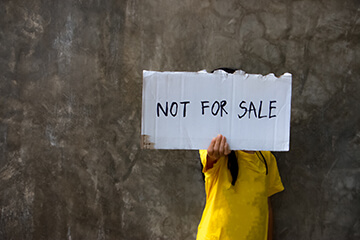About Human Trafficking
The Issue
According to the United Nations, trafficking occurs when someone is recruited, enticed, harboured, transported, provided, obtained, or maintained through force, fraud, or coercion for the purpose of exploitation. Forms of human trafficking include commercial sexual exploitation, labor trafficking, forced & child marriage, organ trafficking, child soldiers, forced begging, servitude, and debt bondage.
.
When the victim is under 18, proving force, fraud, or coercion is not necessary for the offense to be characterized as human trafficking.
There are no exceptions to this rule: no cultural or socioeconomic rationalizations alter the fact that children who are prostituted are trafficking victims. Learn more»
Prevention

The first line of defense against human trafficking is preventing the tragedy from ever occurring in the first place. While some victims are abducted, the majority are coerced through the promise of education, employment, or protection. If the vulnerabilities that lead to trafficking in the first place can be effectively addressed, the number of people falling victim to human trafficking will decrease.
Prevention strategies include combating poverty, protecting children through parental assistance, providing educational and job opportunities, changing existing laws to make the buying and selling of human beings more risky, and educating vulnerable communities about the common recruitment techniques in their context.
Intervention
Intervention is the very narrow focus of investigating suspected cases of human trafficking, rescuing victims, addressing their immediate needs, and prosecuting perpetrators. This part of combating modern-day slavery is closely linked with local law enforcement and government structures, though in many places non-government organizations (NGOs) assist law enforcement to maximize effectiveness and reach.
In Indonesia, intervention is the weakest link of the anti-trafficking chain. This is largely due to the fact that intervention relies on government recognition of the problem, police cooperation with victim services, facilitation of arrests, and prosecution of lawbreakers. Government funding for anti-trafficking work is grossly inadequate, and some anti-trafficking police units require officers to pay for their investigations out of their own pockets with promises to reimburse their expenses (which may or may not happen). As noted by researchers, this policing system can lead to “possible disincentives and avenues for corruption.” In many cases, law enforcement officers are not able or willing to fund investigations, and at times ask anti-trafficking organizations to pay for criminal investigations of human trafficking. If this is not possible, the investigation is often dropped completely because there simply is no money to support the effort leading to very low numbers of arrests and prosecutions. For example, according to the 2020 Trafficking in Persons Report, the Indonesian Commission for the Protection of Children identified 140 suspected child trafficking victims. However, data estimates a minimum of 80,000 children were victims of commercial sexual exploitation. Similar patterns are observed in the reporting of forms of labor trafficking and the trafficking of migrant workers.
Challenges facing law enforcement in different regions vary, but local NGOs recognize that there is an overall shift in openness and interest in addressing human trafficking at a national level. The coordination and partnership between law enforcement and organizations specializing in rescue across the country is ongoing and an area of great hope for Dark Bali and its partners. Our regional Task Forces comprised of local NGOs, government social ministries, and regional anti-trafficking police units are aimed at bridging the gap between victim services and law enforcement as both groups build trust and begin to coordinate services to better identify, rescue, and restore victims of human trafficking.
Restoration
The restoration process looks different for each survivor. Each person needs individualized care in order to heal from trauma and ensure a safe future free from re-trafficking. For some, spending time in a live-in aftercare community gives them the space to heal, and for others, going home to loving families is the best option.
Quality aftercare is holistic and encompasses:
- The mental, spiritual, and emotional health of the survivor (trauma and on-going counseling)
- Repatriation and reunion of families if appropriate
- Health care
- Retroactive education & job training
- Legal aid
- Safe employment
The Role of NGOs
The Dark Bali community is comprised of many organizations fighting human trafficking through thoughtful prevention programs, collaborative intervention work, and different aspects of restoration. No single organization can effectively address each of these areas alone. This is why it is important for NGOs and government services to work closely with one another to provide the best care for survivors and those vulnerable to human trafficking.





